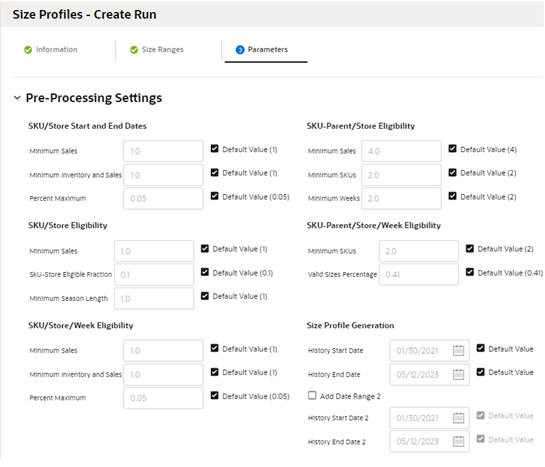Parameters Tab
The Parameters tab displays the parameters that are used by the size profile generation algorithm. The escalation path is used to cluster data and estimate profiles at different levels (that is, merchandise/location or merchandise/location/attribute) and find the optimal size profiles that best represent the expected demand pattern and is most robust to stock out periods, imbalanced stock across sizes and other factors. When a size profile at a given level of the escalation path does not meet the post-processing criteria, it automatically gets rejected and the size profile associated with a higher level is examined. This process continues until a valid size profile is fond at one of the levels along the escalation path.
The lowest level of the escalation path in a run defines the level of the profiles generated in that run. For example, if the escalation path consists of department-region, department-location, subclass-region, and subclass-location, the size profiles will be generated at subclass-location level, that is one profile for each subclass/location/size range. In addition, for all runs at any level, size profiles will also be generated at the lowest level (style-color/location).
The parameters of the size profiles estimation algorithm fall into two categories: pre-processing and post-processing.
You can edit the values for these parameters, as shown in Figure 8-6. The default values of the parameters are defined in SPO_DFLT_PARAMETER. You can modify the default values using the Manage System Configuration screen under the Control & Tactical Center. The table below shows the name, description, and default value of the parameters.
Figure 8-6 Create Run Showing Parameters Tab

Description of "Figure 8-6 Create Run Showing Parameters Tab"
| PARAMETER_NAME | PARAMETER_TYPE | UI_PARAMETER_LABEL | PARAMETER_VALUE | DESCRIPTION |
|---|---|---|---|---|
| SPO_MIN_SALES | SKU/Store Start and End Dates | Minimum Sales | 1 | Minimum Sales for determining start and end dates. |
| SPO_MIN_INV_SALES | SKU/Store Start and End Dates | Minimum Inventory and Sales | 1 | Minimum Inventory and Sales for determining start and end dates. |
| SPO_PCT_MAX | SKU/Store Start and End Dates | Percent Maximum | 0.05 | Percent Maximum for determining start and end dates. |
| SPO_MIN_SALES_SKU_STR | SKU/Store Eligibility | Minimum Sales | 1 | Minimum Sales SKU-Store for determining SKU-Store Eligibility. |
| SPO_ELIG_FRACTION_SKU_STR | SKU/Store Eligibility | SKU-Store Eligible Fraction | 0.1 | Eligible Fraction SKU-Store for determining SKU-Store Eligibility. |
| SPO_MIN_SEASON_LEN_SKU_STR | SKU/Store Eligibility | Minimum Season Length | 1 | Minimum Season Length SKU-Store for determining SKU-Store Eligibility. |
| SPO_MIN_SALES_SKU_STR_WK | SKU/Store/Week Eligibility | Minimum Sales | 1 | Minimum Sales for determining SKU/Store/Week Eligibilit |
| SPO_MIN_INV_SALES_SKU_STR_WK | SKU/Store/Week | Minimum Inventory and Sales | 1 | Minimum Inventory and Sales for determining SKU/Store/Week Eligibility |
| SPO_PCT_MAX_SKU_STR_WK | SKU/Store/Week Eligibility | Percent Maximum | 0.05 | Percent Max SKU-Store-Week for determining SKU/Store/Week Eligibility |
| MIN_SLS_PRNT_STR_WK | SKU-Parent/Store Eligibility | Minimum Sales | 4 |
Minimum sales units for determining SKU-Parent/Store Eligibility. |
| MIN_SKUS_PRNT_STR_WK | SKU-Parent/Store Eligibility | Minimum SKUs | 2 | Minimum SKUs for determining SKU-Parent/Store Eligibility |
| MIN_WKS_PRNT_STR_WK | SKU-Parent/Store Eligibility | Minimum Weeks | 2 | Minimum Weeks for determining SKU-Parent/Store Eligibility |
| SPO_MIN_SKU_STR_WK | SKU-Parent/Store/Week Eligibility | Minimum SKUs | 2 | Minimum SKUs for determining SKU-Parent/Store Eligibility |
| SPO_PCT_SZ_RNG_PRNT_STR_WK | SKU-Parent/Store/Week Eligibility | Valid Sizes Percentage | 0.41 | Percent Size Range for determining SKU-Parent/Store Eligibility. |
| SPO_SZ_PRO_GEN_METHOD | Size Profile Generation |
Size Profile Generation Method |
Optimization | The size profile generation method (Optimization or Normalized). |
| SPO_SKU_PRNT_STR_WK | Postprocessing | Valid Sample Threshold | 2 | Post Processing threshold: Min number of SKU-parent/store/weeks with at least one valid sale. |
| SPO_TOT_UNIT_SLS | Postprocessing | Valid Sales units Threshold | 2 | Post Processing threshold: Min number of valid sales units that each size in the partition should have. |
| SPO_TOT_UNIT_SLS_PCT_SIZES | Postprocessing | Valid Sizes Percentage | 0.4 | Post Processing threshold: Min Percent of sizes. |
| SPO_SALE_PROF_CORR_THRESHOLD | Postprocessing | Threshold for correlation with Sales Profile | 0.9 | This parameter provides the correlation threshold between size profiles and sales profile. |
| SZ_PROF_OVER_CORR_THRESHOLD | Postprocessing | Threshold for size profiles compared with historical sales profile | 2 | Indicates size profiles are compared with historical sales profile and if the ratio between size profile and sales profile exceeds this value for at least one size, profile is flagged and is shown in UI under over-correction tile in run output |
| SPO_KINK_INNER_RATIO | Kink Size Analysis | Kink Inner Ratio | 1.1 | The default value for kink inner ratio. |
| SPO_KINK_OUTER_RATIO | Kink Size Analysis | Kink Outer Ratio | 1.03 | The default value for kink inner ratio. |
| SPO_CORR_LOW_SELL_FLG | Low Seller Correction | Correct Size Profiles for Low Sellers | Y | The flag (Yes or No) to indicate whether to apply post processing to correct size profiles of low sellers |
| SPO_LOW_SELL_AVG | Low Seller Correction | Average Weekly Sales of SKU | 1 | Average weekly sale units across a season, below which deems a SKU (Size) to be a low seller. |
| ENABLE_OVER_CORR_FILTER_FLG |
Postprocessing |
Enable size profiles over-correction filter flag | Y | Y/N flag which indicates whether the profiles that have over-correction should be removed during post-procesing (Y) or should be kept in the final set of profiles and just be flagged as over-corrected (N). |